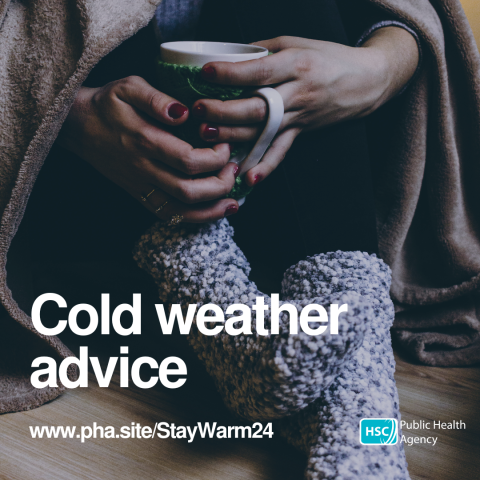Keeping warm at home during cold weather

Cold weather can have a serious impact on our health, and with temperatures dropping, the Public Health Agency (PHA) has some advice for keeping warm at home.
Tracey Colgan, Senior Health and Wellbeing Improvement Officer at the PHA, said:
“Many people may be reluctant to put on their household heating with energy costs at high levels, but being cold poses serious health risks, particularly for older people and those with heart and lung problems, as it increases the risks of heart attacks, strokes and chest infections.
“Cold homes can also cause and worsen respiratory conditions and cardiovascular diseases, especially for those already vulnerable to the impacts of cold weather, including people who are older, pregnant women, young children and those living with long term health conditions and dementia.”
“It is understandable that people may be unable or reluctant to heat their home, in order to help save money. If you are unable to put your heat on, please try to take other steps to try to keep warm at home.”
Ten top tips for keeping warm at home:
- Wear multiple layers of clothing and a hat and gloves, even indoors if it is cold.
- Wear bed socks and thermal underwear at night.
- Wear clothes made of wool, cotton, or fleecy synthetic fibres.
- Eat warm food and take warm drinks regularly. Food is a source of energy which helps to keep your body warm.
- Keep active. When you’re indoors, try not to sit still for more than an hour or so. If you find it difficult to move about, stretching your arms and legs can also help keep you warm.
- Never use an electric blanket and hot water bottle together as you could electrocute yourself.
- Heat your main living room to around 18-21ºC (64-70ºF) and the rest of the house to at least 16ºC (61ºF) if you can. If you can’t heat all your rooms, make sure that you keep your living room/room you spend the most time in, warm throughout the day.
- It is important to make sure your heating is safe and that your house is properly ventilated to reduce the risk of carbon monoxide poisoning.
- If you have electric controls for your heating, set the timer on your heating to come on before you get up and switch off when you go to bed so you are only using the amount you need.
- In very cold weather set the heating to come on earlier, rather than turning the thermostat up, so you won’t be cold while you wait for your home to heat up.
Tracey continued: “This work complements and contributes to the ongoing work by the PHA to improve health and tackle health inequalities. We encourage anyone who is struggling with bills or to heat their home to reach out for help.”
Local councils may be able to offer support, guidance or information, on projects and organisations providing practical support, to help tackle and alleviate food and fuel poverty.
The Northern Ireland Housing Executive offers households free and impartial energy advice Freephone: 0800 111 4455
Useful links to services and further advice:
